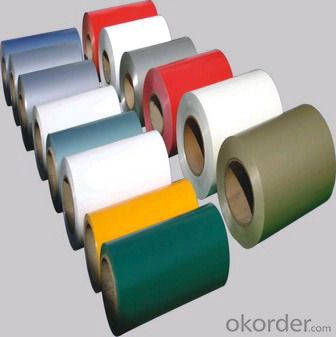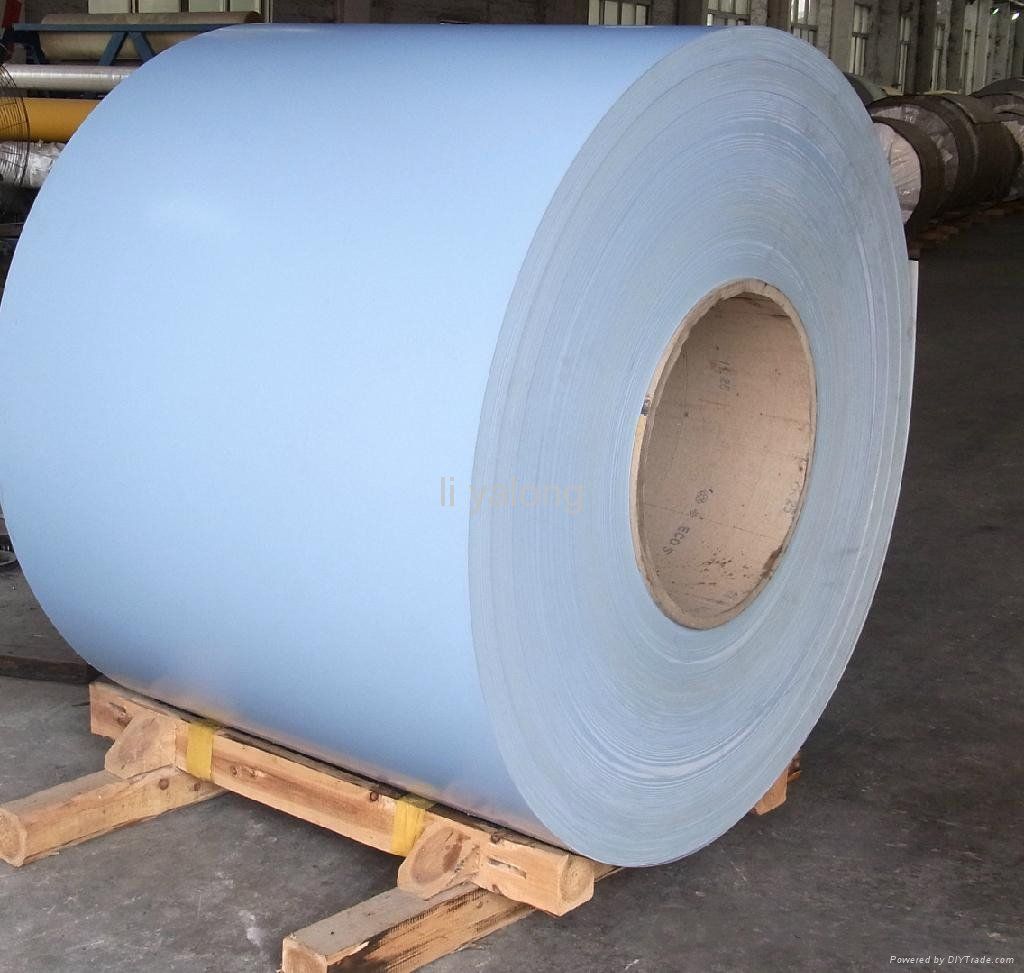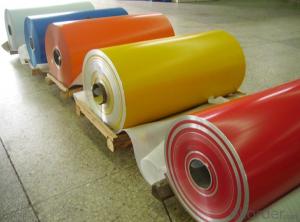RAL 1032 PVDF 25 Micros Coated Aluminium Coil
- Loading Port:
- Shanghai
- Payment Terms:
- TT OR LC
- Min Order Qty:
- 5 m.t.
- Supply Capability:
- 50000 m.t./month
OKorder Service Pledge
OKorder Financial Service
You Might Also Like
Item specifice
Description
Product | RAL 1032 PVDF 25 Micros Coated Aluminium Coil | ||
Alloy | 1100, 1145, 1050, 1060, 1070, 3003, 3013, 3005, 3A21,4343,4045, 5052, 5082, 5083, 5086,6061, 8011 etc. | Temper | H12.H14.H16.H18.H22. H24.H26.H32.H34.H36. H38.O etc. |
Thickness | 0.2-7.0mm | Width | Until 2550 |
Painting items | PE and PVDF | Color | All Standards of RAL |
Coil weight | At clients’ requestments | MOQ | 5 tons |
Payment terms | 30% down payment 70% against B/L copy, L/C at sight | ||
Delivery time | 20-30 days after getting your down payment | ||
Package | Wooden Pallet (Customized packing ways are welcomed) | ||
Remarks | The special dimensions can be produced according to clients’ specification | ||


PE and PVDF Painting
Polyester Coatings (PE)
PE (polyester) coatings exhibit an excellent combination of hardness, flexibility, flow, appearance, and superior resistance to dirt retention in indoor and outdoor applications. These coatings are highly resistant to abrasion, metal marking, staining, and marring, and require minimal maintenance. Glazetech uses polyester paints which provide excellent colour and gloss retention properties.
Polyvinylidene Fluoride Coatings (PVDF)
PVDF (polyvinylidene fluoride) is a chemical resistant thick film barrier coating commonly used in architectural applications where both excellent appearance and substrate protection must be maintained over a long period of time. This coating is unaffected by most chemicals and solvents and has excellent wear and abrasion resistance. PVDF also has a high dielectric strength, excellent resistance to weathering and the ability to self extinguish.Application
Widely used in manufacturing of products as well as other industrial applications like:
Products Materials: PP cap stock, the traffic sign, air-conditioner heat and exchangers, food container, household foil, pharmaceutical packing, cigarettes packing etc.
Building Materials: aluminum curtain wall base plate, ACP, aluminum, ceilings, aluminum sheets, honeycomb panels and aluminum roofing, lighting decoration, household electrical appliances, food package (such as pop can cover & ring-pull), furniture ect.
- Q:Are aluminum coils suitable for decorative applications?
- Indeed, decorative applications can benefit greatly from the use of aluminum coils. This versatile and lightweight material boasts exceptional corrosion resistance, rendering it an optimal selection for decorative purposes. Its ability to be effortlessly shaped, formed, and fabricated into a myriad of designs, patterns, and finishes grants endless possibilities in the realm of decoration. Furthermore, aluminum coils can be coated with various colors and finishes, including anodized or painted coatings, to augment both their aesthetic allure and durability. Thus, whether utilized for interior or exterior decoration, the utilization of aluminum coils offers a visually captivating and economically viable solution.
- Q:Can aluminum coils be used in outdoor applications?
- Yes, aluminum coils can be used in outdoor applications. Aluminum is highly resistant to corrosion, making it a suitable material for outdoor use. It is commonly used in the construction industry for outdoor structures such as roofs, gutters, and siding. Additionally, aluminum coils are lightweight and easy to work with, making them a popular choice for outdoor applications. However, it is important to note that the specific grade and thickness of the aluminum coil should be considered to ensure it can withstand the environmental conditions of the specific outdoor application.
- Q:Can aluminum coils be used in food storage facilities?
- Yes, aluminum coils can be used in food storage facilities. Aluminum is a widely used material in the food industry due to its excellent properties such as its lightweight, durability, corrosion resistance, and heat conductivity. These qualities make aluminum coils suitable for various applications in food storage facilities. Aluminum coils can be utilized in refrigeration systems, air conditioning units, and food storage cabinets, among others. Additionally, aluminum is non-toxic and does not react with food or alter its taste, making it a safe option for food storage. However, it is important to ensure that the aluminum coils used in food storage facilities are properly cleaned and maintained to prevent any potential contamination.
- Q:What will be the pros and cons of using each of these materials?One thing to keep in mind is that aluminum alloys are good conductors of electricity.
- Aluminum is strong and lighter, but not electrically safe. Fiberglass is safe for electrical work and strong, but susceptible to sun damage, and can give out due to cracking. Wood will wear out, and is also damaged by weather, but is safe with electricity.
- Q:What is the typical elongation of aluminum coils?
- The typical elongation of aluminum coils can vary depending on the specific alloy and manufacturing process, but it generally ranges from 5% to 30%.
- Q:What are the different coil widths available for aluminum coils?
- The coil widths available for aluminum coils can vary depending on the specific requirements and manufacturing capabilities. However, common standard coil widths for aluminum coils typically range from 12 inches (304.8 mm) to 60 inches (1524 mm). These standard widths are commonly used in various industries, including construction, automotive, and packaging. In addition to the standard widths, manufacturers can also provide custom coil widths to meet specific customer needs. These custom widths can be narrower or wider than the standard range, allowing for more flexibility in design and application. It is important to note that the availability of specific coil widths may vary depending on the supplier and the specific aluminum alloy being used. Therefore, it is recommended to consult with a reputable aluminum coil supplier to determine the exact range of coil widths available for a particular project or application.
- Q:Can aluminum coils be painted or coated after installation?
- Yes, aluminum coils can be painted or coated after installation.
- Q:How to remove the fingerprint and glue residue on the color aluminum coil?
- Try to use essential balm. We often use the essential balm to remove glue residue on the stainless steel bowl and basin.
- Q:How are aluminum coils used in the production of industrial machinery?
- Due to their unique properties and benefits, aluminum coils find wide usage in the production of industrial machinery. These coils are typically crafted from high-quality aluminum alloy, which offers outstanding strength, durability, and resistance to corrosion. One notable application of aluminum coils in industrial machinery lies in the manufacturing of heat exchangers. Heat exchangers play a pivotal role in diverse industrial processes, including refrigeration, HVAC systems, and power generation. Aluminum coils prove ideal for heat exchangers owing to their high thermal conductivity, enabling efficient heat transfer. Furthermore, aluminum coils also find utilization in the production of industrial equipment like air compressors, pumps, and turbines. The lightweight nature of aluminum renders it a superb choice for these applications, as it aids in reducing the overall weight of the machinery. Consequently, this leads to enhanced energy efficiency and reduced operational costs. Another significant advantage of aluminum coils lies in their malleability and formability. Aluminum exhibits high ductility, meaning it can be easily shaped and formed into various intricate geometries required for the machinery's components. This facilitates the creation of intricate parts and structures by manufacturers, ensuring precise fit and optimal performance. Moreover, aluminum coils possess exceptional resistance to corrosion, making them suitable for machinery deployed in harsh environments or exposed to corrosive materials. This corrosion resistance contributes to prolonging the machinery's lifespan and diminishing the need for frequent maintenance or part replacement. To summarize, aluminum coils serve as crucial components in the production of industrial machinery. They provide strength, durability, lightweight, and corrosion resistance, making them well-suited for diverse applications such as heat exchangers, air compressors, pumps, and turbines. Additionally, their malleability enables the fabrication of intricate parts, ensuring precise fit and optimal performance.
- Q:What are the factors that affect the price of aluminum coils?
- There are several factors that can affect the price of aluminum coils. One of the primary factors is the global supply and demand for aluminum. If there is a shortage of aluminum, the price of aluminum coils is likely to increase. On the other hand, if there is an oversupply of aluminum, the price may decrease. Another factor that can impact the price of aluminum coils is the cost of raw materials. Aluminum is derived from bauxite, and the cost of mining and extracting bauxite can vary depending on factors such as labor costs, energy prices, and government regulations. Any changes in these factors can affect the overall cost of producing aluminum, which in turn can influence the price of aluminum coils. Transportation costs also play a role in determining the price of aluminum coils. Aluminum is often transported over long distances, and the cost of shipping or trucking can vary depending on fuel prices, distance, and other logistical factors. Higher transportation costs can add to the overall price of aluminum coils. Currency exchange rates can also impact the price of aluminum coils. Aluminum is traded on global markets, and changes in exchange rates can affect the cost of importing or exporting aluminum. If the currency in which aluminum is traded strengthens against other currencies, the price of aluminum coils may increase. Lastly, market competition can affect the price of aluminum coils. If there are multiple suppliers of aluminum coils, they may compete with each other to secure customers. This competition can lead to price fluctuations as suppliers try to attract buyers by offering competitive prices. In conclusion, the price of aluminum coils can be influenced by factors such as global supply and demand, the cost of raw materials, transportation costs, currency exchange rates, and market competition. Understanding these factors can help businesses and consumers anticipate and respond to changes in the price of aluminum coils.
1. Manufacturer Overview |
|
|---|---|
| Location | |
| Year Established | |
| Annual Output Value | |
| Main Markets | |
| Company Certifications | |
2. Manufacturer Certificates |
|
|---|---|
| a) Certification Name | |
| Range | |
| Reference | |
| Validity Period | |
3. Manufacturer Capability |
|
|---|---|
| a)Trade Capacity | |
| Nearest Port | |
| Export Percentage | |
| No.of Employees in Trade Department | |
| Language Spoken: | |
| b)Factory Information | |
| Factory Size: | |
| No. of Production Lines | |
| Contract Manufacturing | |
| Product Price Range | |
Send your message to us
RAL 1032 PVDF 25 Micros Coated Aluminium Coil
- Loading Port:
- Shanghai
- Payment Terms:
- TT OR LC
- Min Order Qty:
- 5 m.t.
- Supply Capability:
- 50000 m.t./month
OKorder Service Pledge
OKorder Financial Service
Similar products
New products
Hot products
Related keywords





























